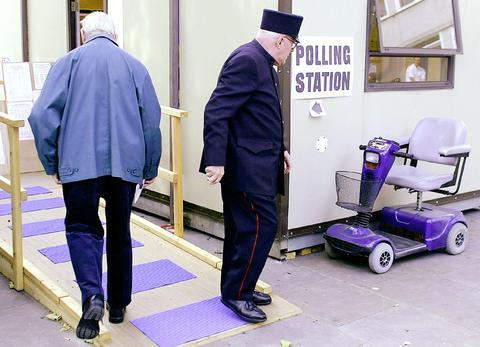Britons angry over Iraq have given Prime Minister Tony Blair a drubbing in local elections, relegating his ruling Labour Party to an unprecedented third place.
"It's a bad night for us, but it's not meltdown," Blair's Home Secretary David Blunkett said yesterday. "On Iraq, we are very clear about that -- it has damaged us."

PHOTO: REUTERS
Thursday's local council poll outcome -- likely to be echoed in European Parliament results tomorrow -- will inevitably renew speculation about Blair's leadership.
But analysts still expect him to take Labour to a third general election victory next year despite his humiliation at the polls, the biggest test of public feeling both since the Iraq war and since Blair won a second term in 2001.
With nearly half the results counted by early Friday -- 82 of 166 councils up for grabs -- Labour had lost a net 211 seats, closing in on the overall loss of 400 or more which analysts had projected as a benchmark of seriousness for Blair.
The BBC projected Labour's vote share at just 26 percent, way behind the Conservatives on 38 percent, and also behind Britain's third party, the Liberal Democrats, on 30 percent.
"What you have got is a government that is clearly unpopular but a main opposition party that is not capitalizing," pollster Peter Kellner said, adding that the Conservatives needed 40 percent to be on course for victory next year.
"Blair will not be as shiningly popular as he was in 1997 but I think people will prefer to trust him again."
The Conservatives were in upbeat mood.
"It has been Labour's worst electoral performance in living memory and it is the first time that a government has been pushed into third place in mid-term elections," crowed party chairman Liam Fox.
The message of disillusionment will not be lost on Blair and will undoubtedly heighten calls from for him to give way to Chancellor of the Exchequer Gordon Brown.
Thursday's turnout was around 40 percent.

MAKING WAVES: China’s maritime militia could become a nontraditional threat in war, clogging up shipping lanes to prevent US or Japanese intervention, a report said About 1,900 Chinese ships flying flags of convenience and fishing vessels that participated in China’s military exercises around Taiwan last month and in January have been listed for monitoring, Coast Guard Administration (CGA) Deputy Director-General Hsieh Ching-chin (謝慶欽) said yesterday. Following amendments to the Commercial Port Act (商港法) and the Law of Ships (船舶法) last month, the CGA can designate possible berthing areas or deny ports of call for vessels suspected of loitering around areas where undersea cables can be accessed, Oceans Affairs Council Minister Kuan Bi-ling (管碧玲) said. The list of suspected ships, originally 300, had risen to about 1,900 as

Right-wing political scientist Laura Fernandez on Sunday won Costa Rica’s presidential election by a landslide, after promising to crack down on rising violence linked to the cocaine trade. Fernandez’s nearest rival, economist Alvaro Ramos, conceded defeat as results showed the ruling party far exceeding the threshold of 40 percent needed to avoid a runoff. With 94 percent of polling stations counted, the political heir of outgoing Costa Rican President Rodrigo Chaves had captured 48.3 percent of the vote compared with Ramos’ 33.4 percent, the Supreme Electoral Tribunal said. As soon as the first results were announced, members of Fernandez’s Sovereign People’s Party

MORE RESPONSIBILITY: Draftees would be expected to fight alongside professional soldiers, likely requiring the transformation of some training brigades into combat units The armed forces are to start incorporating new conscripts into combined arms brigades this year to enhance combat readiness, the Executive Yuan’s latest policy report said. The new policy would affect Taiwanese men entering the military for their compulsory service, which was extended to one year under reforms by then-president Tsai Ing-wen (蔡英文) in 2022. The conscripts would be trained to operate machine guns, uncrewed aerial vehicles, anti-tank guided missile launchers and Stinger air defense systems, the report said, adding that the basic training would be lengthened to eight weeks. After basic training, conscripts would be sorted into infantry battalions that would take

GROWING AMBITIONS: The scale and tempo of the operations show that the Strait has become the core theater for China to expand its security interests, the report said Chinese military aircraft incursions around Taiwan have surged nearly 15-fold over the past five years, according to a report released yesterday by the Democratic Progressive Party’s (DPP) Department of China Affairs. Sorties in the Taiwan Strait were previously irregular, totaling 380 in 2020, but have since evolved into routine operations, the report showed. “This demonstrates that the Taiwan Strait has become both the starting point and testing ground for Beijing’s expansionist ambitions,” it said. Driven by military expansionism, China is systematically pursuing actions aimed at altering the regional “status quo,” the department said, adding that Taiwan represents the most critical link in China’s